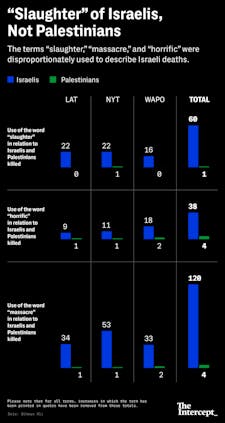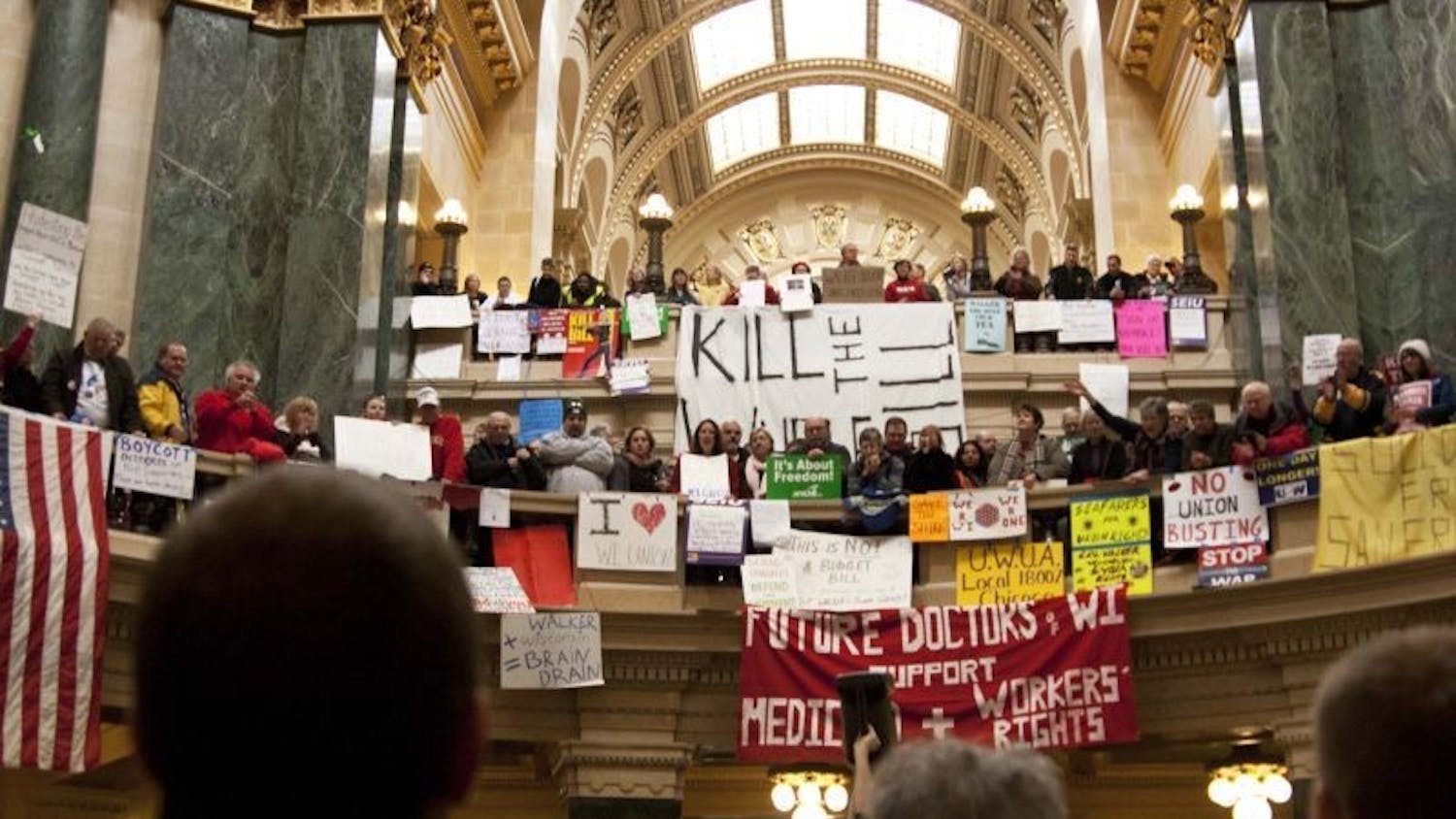Palestinian-American journalist Deanna Othman spoke about differences in media narratives for Palestine and Israel at a Sunday event hosted by Students for Justice in Palestine (SJP) at Memorial Union.
Othman, a high school journalism teacher of 16 years who has been published in outlets including the Chicago Tribune and Huffington Post, centered her talk around critical analysis of contemporary reporting on the Palestinian movement.
Here are five takeaways from the talk:
Media literacy
Othman cited the definition of media literacy from a 1992 Aspen Media Literacy Leadership conference as “the ability to access, analyze, evaluate and create media in a variety of forms.” She used that definition of media literacy as a method of understanding the media's role in 21st-century democracies.
Othman encouraged readers to carefully examine news about Palestine, citing the importance of considering credibility, credentials, accuracy, potential biases and missing perspectives in reporting.
She said reporting on Israel often includes Israeli academics, government officials and ambassadors as sources, but reporting on Palestine typically highlights Palestinians without similar credentials.
“Answers to reporters’ questions are not going to be balanced in terms of the built-in familiarity of the [interviewee] that’s trained to deal with media and who knows public relations terminology, versus the [interviewee] who... may have the right ideas that they want to communicate without the skills to do so accurately or effectively.”
Othman credited social media with bringing “an explosion of [Palestinian] perspectives” to the outside world and encouraging people to engage in more in-depth media literacy practices toward media coverage of Palestine.
Orientalism
Othman said Orientalism is an important concept by which to analyze Western media coverage of Palestine.
Coined by Palestinian-American academic Edward Said in 1978, Orientalism is the acceptance of a “basic distinction between East and West as the starting point for elaborate [Western] theories... and political accounts concerning the Orient, its people, customs, ‘mind,’ destiny and so on.”
Othman cited articles about Israel being “the only democracy in the Middle East” and Palestine being a “hate-soaked culture” of “bloodthirsty savages” as examples of Orientalist bias. She also cited British radio presenter Julia Hartley-Brewer’s interview with Palestinian politician Mustafa Barghouti, where Brewer accused Barghouti of “not being used to women talking.”
“This is the idea of the barbarian versus the civilized,” Othman said. “That you can negotiate with [Israelis], go through rational steps with them, but that it doesn’t work with Palestinians.”
Language, framework and narrative
Othman’s talk focused on the relationship between language and journalistic framework in shaping a distinct media narrative about Palestine and Palestinians.
Othman said Western journalists use framing to emphasize the effects of the Oct. 7 Hamas attacks on Israelis while de-emphasizing the effects of the Israeli government’s attacks on Palestinians. She referenced an Oct. 8 BBC interview where Hussam Zomlot, British ambassador to Palestine, was repeatedly asked by the interviewer if he condemned Hamas.
“How many times has Israel committed war crimes right on your own cameras? Do you start by asking them to condemn themselves?” Zomlot responded. “At the very heart of [the question] is [a] misrepresentation of the whole thing.”
Othman also said media framing of Israel and Palestine trends toward oversimplified “binaries” that ignore nuances in political power between the two nations.
“Even the sheer fact of calling it the Israel-Hamas war, which is kind of the standard now, is very problematic,” Othman said in an interview with The Daily Cardinal. “You're portraying it as a war with two sides instead of a war of one side on another side.”
According to Othman, this framework of Gaza stems mainly from discrepancies in the language media outlets use to describe Palestinian and Israeli casualties.
An analysis by The Intercept found these discrepancies across more than 1,000 articles published by The New York Times, Los Angeles Times and Washington Post within six weeks of Oct. 7.

Othman criticized these linguistic differences for reducing empathy toward Palestinians and “removing accountability” when Israel is responsible for civilian and press deaths. She criticized language calling Palestinian civilians “Hamas’ human shields” as a justification for “the complete demolition of the healthcare system in Gaza.”
The controversy around ‘Screams Without Words’
The New York Times published an article on Dec. 28 titled “Screams Without Words: How Hamas Weaponized Sexual Violence on Oct. 7”, written by Jeffrey Gettleman and Adam Sella in conjunction with Sella’s aunt, Israeli filmmaker Anat Schwartz. Othman called attention to elements of the report that she said affect its credibility.
First, Othman noted Schwartz’s background as a former Israeli Air Force intelligence official with no prior journalistic experience. She also said Schwartz liked a tweet prior to her report that suggested Gaza should be turned into a “slaughterhouse.” Schwartz’s action violated the Times’ social media guidelines for reporters.
Othman said Schwartz admitted to initially being “unable to get confirmations for her claims” that Hamas systematically utilized sexual violence as a weapon of war, despite extensively interviewing Israeli hospitals, rape crisis centers, trauma recovery facilities and sex assault hotlines.
Othman also said certain facts presented in the Times article missed independent verification and have even been called into question by sources themselves. The article’s central claim that deceased Israeli civilian Gal Abdush was likely raped and murdered by Hamas has been rejected by Abdush’s brother-in-law, sisters and friend, according to progressive news outlet Mondoweiss.
“[Screams Without Words] was very instrumental in making [Israel’s] case for what it has been doing in Palestine and for the perception that people have about the resistance,” Othman said. “The story was not verified in terms of the intelligence included in the facts and reporting.”
Advice for civilians, journalists
Othman said she holds an optimistic view of the “shift” in public narratives about Palestine since Oct. 7 despite her contentions with mainstream coverage.
“I think previously there was a lot of hesitation in even bringing up the idea of Palestinians having the right to defend themselves, for example,” Othman told the Cardinal. “There has been an ability [now] to address certain things directly more so than in the past.”
Othman said civic engagement with local and national media is important for “holding media outlets accountable” in their depictions of Palestine-related issues and inclusion of Palestinian voices.
“There were instances where [Chicago ceasefire advocates] sent emails, [and media outlets] altered some of their language or made an effort to bring in other people to interview to offer different narratives,” she said. “Sometimes we underestimate the importance of responding.”
For journalists, Othman suggested prioritizing accuracy over objectivity in Palestine coverage due to her disbelief that any journalist can report without bias. She said she views overemphasis on objectivity as part of the Orientalist mindset that Palestinians cannot be trusted to report fairly.
“Listening to Palestinian voices and watching the videos of Palestinian journalists is really important [for foreign news organizations] because it provides context without necessarily having to go back historically,” Othman said.
Othman said she believes that with time, society will recognize which media outlets “manufactured consent” for the destruction in Gaza and which ones abided by strict editorial standards.
“It's very easy to call out things in retrospect. It's very easy to look back and say that, ‘yes, this was wrong,’ when you're so far removed from the situation. But when you're actually going through it, it takes true courage sometimes to take that stand,” Othman said. “If you were just sitting there passively and accepting what was happening, you err on the side of history.”
Sreejita Patra is a senior staff writer and the former summer ad sales manager for The Daily Cardinal. She has written for breaking news, campus news and arts. She also covered the Oregon Village Board for the Oregon Observer.






